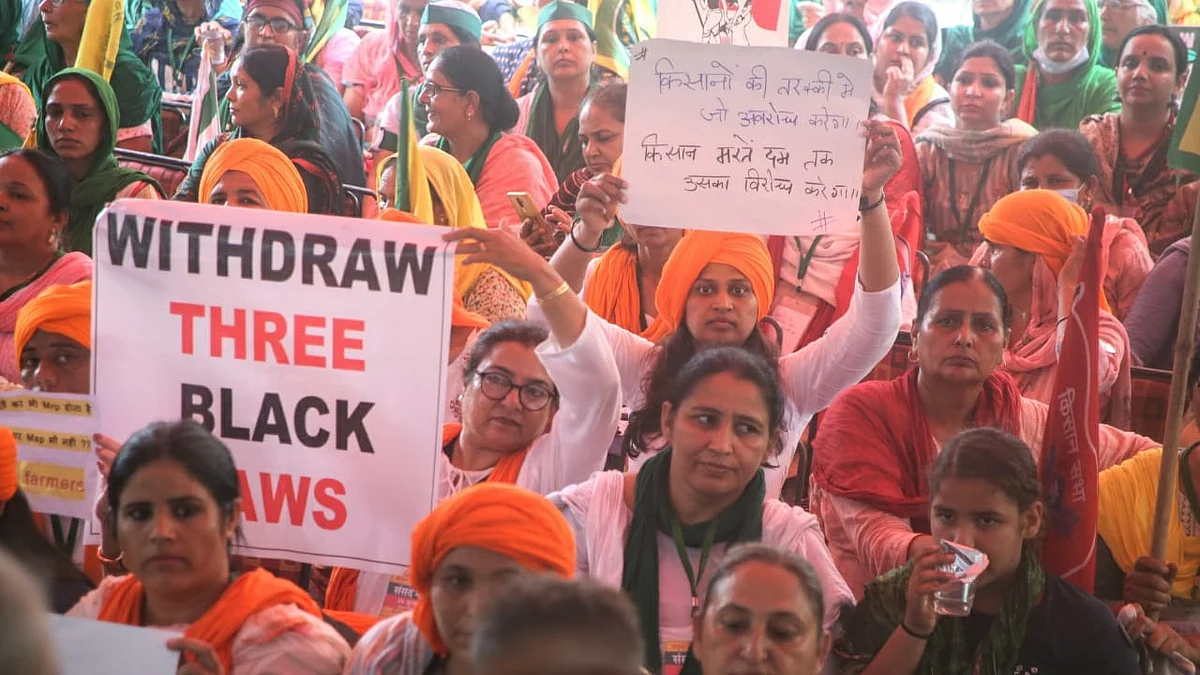Active participation of women in farmers’ protests against farm laws exposes govt’s false narrative
If Modi’s three farm laws bring corporates to the farms, it would be the women who would suffer the most, even within the agriculture community

Women, the hardest hit segment of our population, first, due to the outbreak of COVID-19; secondly due to mishandling of the situation; and thirdly due to enactment of the three farm laws seeking to bring corporates to the farms in the midst of the crisis, are making history by coming out in forefront in the battle against Modi’s farm laws with renewed vigour.
The holding of an all-women ‘Kisan Sansad’ at Jantar Mantar to mark eight months of the farmers’ agitation on July 26, 2021 has added a new dimension to the farmers’ agitation that is already making history in the farmers’ movement in India.
It is a significant development for several reasons, and one of them should silence those in the government who have been trying all along to malign the agitating farmers by propagating their narrative that the agitators were not farmers, that there were even ‘terrorists’ among them, they were been financed by terror funds, they were hooligans, and so on. At best, the government narrative said that the farmers were misled by the people who don’t want to see India prosper.
The latest narrative was from a woman Union Minister who said they were hooligans, though she later withdrew her comment after severe criticism and a demand to resign. Now, with the all-women protest at Jantar Mantar, the false narrative of the government is sufficiently exposed.
The world has seen how the all-women ‘Kisan Sansad’ was more orderly than even the Parliament of India proceedings. One cannot call them ‘anti-national’ when they commenced their proceedings with singing the national anthem. Then they observed a silence for two minutes in memory of the hundreds of farmers who lost their lives during the agitation. Their husbands, sons and brothers were booked even on the charges of sedition, and hundreds of them were booked for several other offences, but the protesting women have showed their mettle.
The all-women ‘Kisan Sansad’ is not the first event in which women participated, though it was the first exclusively held by women. Men and women have equally taken part in the protests ever since the agitation began on November 26 at the three borders of Delhi – Singhu, Tikri, and Ghazipur. Many of them are along with their children for months now.
The government’s strategy seems to be to try their patience, and there is no indication or communication from it to the farmers for any dialogue.
It should be recalled that protesting farmers had observed January 18, 2021, as ‘Mahila Kisan Diwas’ (Women Farmer’s Day) to honour the contribution of women to the protest against Modi’s three farm laws, nearly two months after the farmer’s agitation began. It was a time when the country was hoping for a solution to the problem in the backdrop of 10 rounds of failed talks between the government and farmers’ representatives. The 11th rounds of talks was scheduled to be held only after three days, i.e., on January 22, which unfortunately failed too due to government’s insistence on keeping the laws, and farmers insistence on their demand for repeal.
On the ‘Women Farmers’ Day’, thousands of women from Punjab, Haryana and Western Uttar Pradesh had been protesting at all the three protesting sites at Delhi’s borders. On International Women’s Day on March 8, 2021, thousands of women farmers had joined the agitating farmers. They had taken to the stage and addressed particular concerns of women farmers.
No one can deny the contribution of women in Indian agriculture. Women have historically been overlooked though they are the invisible workforce on which the whole sector depends. It is despite the fact that they have been facing numerous issues ranging from lack of recognition to absence of land rights.
Women have always been struggling for their rights in agriculture sector but could achieve only a little. If Modi’s three farm laws bring corporates to the farms, it would be the women who would suffer the most, even within the agriculture community. It would be very difficult for women to protect their interests from big corporates, they feel.
Ever since the farmers’ agitation began, women have been playing multiple roles – running the household, caring for children, and taking over the responsibility of farming back home while their husbands, sons, and brothers participate in the protests at Delhi’s borders demanding repeal of the three ‘anti-farmer’ laws which the Union government boastfully calls ‘pro-farmer’.
The all-women ‘Kisan Sansad’ should attract our attention because among all economically active women, 80 per cent work in agriculture and allied activities, 33 per cent as agriculture labour and 48 per cent as self-employed farmers. They play a key role in sowing, transporting, harvesting, food processing, and all allied activities, but only 13 per cent of them own agriculture land. Without landed property they have little access to institutional finance, and interest charged from SHGs are also high compared to other business or industrial activities.
Women’s participation against the farm laws is therefore significant. It will have also a great political ramification because their voting pattern is proportionally very high compared to any other group of voters.
There seems to be no escape for Modi government from seeking a suitable answer to the problem, or else it will have to face the music. Women’s solidarity, and solidarity of the working class, may bring hard times for Modi government and his party.
(IPA Service)
Views are personal
Follow us on: Facebook, Twitter, Google News, Instagram
Join our official telegram channel (@nationalherald) and stay updated with the latest headlines
